《Unit 1 My day PB》教案-优质公开课-人教PEP三起5下精品
人教版(PEP)小学英语五年级下册 教案 Unit1 My day. Part B 第三课时

人教版(PEP)小学英语五年级下册教案Unit 1 My dayPart B1.能完成“Let’s check”部分的听力任务,并描述自己所进行的活动。
2.复习巩固单元重点单词及语法。
3.完成“Let’s wrap it up”部分,总结归纳动词短语。
4.能读懂“Story time”的故事。
1. 能够读懂“Read and write”部分,并能够完成相关的阅读练习和写信练习。
2. 能够灵活运用“always/usually/often+动词短语”进行口头交际及写作。
完成“Let\’s wrap it up”部分的练习,自主总结归纳含“go, play, have, do”的动词短语。
单词卡片、教学光盘。
Step 1:Warm up(1)教师拿出单词卡片“do morning exercises, eat breakfast, have …class, play sports, eat dinner,clean my room, go for a walk, go shopping, take a dancing class”等,让学生“开火车”读动词短语卡(2)运用句型“When do you …?”“At …o\’clock”以及“What do you do on …?”“I always/usually/often/sometimes”,同桌问答。
Step 2:Presentation(1)听“Let\’s check”部分的听力,并听Zhang所做的事情,同时,能够运用句型“I often …/I always …/I sometimes …”来描述自己周末所做的活动。
(2)完成“Let\’s wrap it up”部分,总结带“go, play, have, do”的动词短语,并总结用法和汉语意思,如下,并小组讨论相关用法。
go go swimming go running go shoppingplay play sports play ping pong play the pipahave have class have dinnerdo do homework do kung fu do morning exercises 小结:go+v.ing , play运动器具the+音乐器具,have:吃,喝,有,do:做(较灵活)Step 3:Consolidation and extension(1)完成Story time。
Unit1MyDayPartBLet'slearn(教案)人教PEP版英语五年级下册
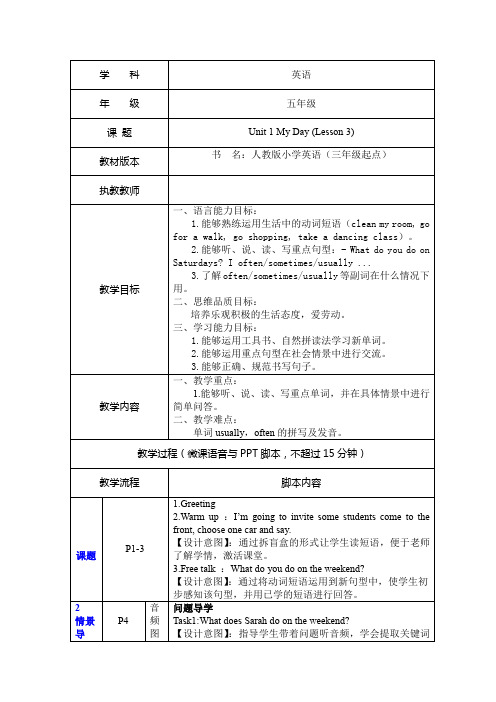
英语
年 级
五年级
课 题
Unit 1MyDay(Lesson 3)
教材版本
书名:人教版小学英语(三年级起点)
执教教师
教学目标
一、语言能力目标:
1.能够熟练运用生活中的动词短语(cleanmyroom, go for a walk, go shopping, take a dancing class)。
2.能够听、说、读、写重点句型:-What do you do on Saturdays? I often/sometimes/usually ...
3.了解often/sometimes/usually等副词在什么情况下用。
二、思维品质目标:
培养乐观积极的生活态度,爱劳动。
三、学习能力目标:
1.能够运用工具书、自然拼读法学习新单词。
3
学习
知识、
提升
认知、巩固
P5-11
图片
呈现新知
教读重点短语并进行扩展,出示重点句型:Ioften...
出示学习策略:利用自然拼读法的方式教读重点句型中的难词,并对其进行解释。
出通过图片的闪现,拼读模仿图片内容,操练短语。
【设计意图】:进行关键短语和句型的教授和操练,巩固所学。
P12-14
图片文段
Task2Canyoufindanyverbphrasesandadverbsoffrequency?
2.Warmup:I’m going to invite some students come to the front, choose one car and say.
【设计意图】:通过拆盲盒的形式让学生读短语,便于老师了解学情,激活课堂。
3.Free talk:What do you do on the weekend?
五年级英语下册 Unit 1 My day PB Read and write 教学设计 人教PEP
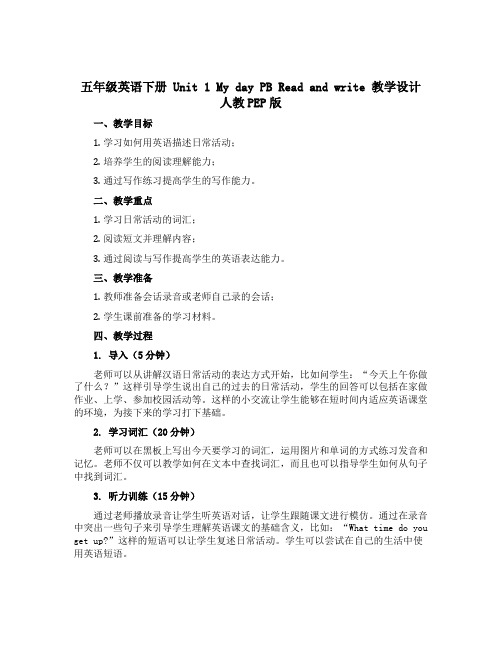
五年级英语下册 Unit 1 My day PB Read and write 教学设计人教PEP版一、教学目标1.学习如何用英语描述日常活动;2.培养学生的阅读理解能力;3.通过写作练习提高学生的写作能力。
二、教学重点1.学习日常活动的词汇;2.阅读短文并理解内容;3.通过阅读与写作提高学生的英语表达能力。
三、教学准备1.教师准备会话录音或老师自己录的会话;2.学生课前准备的学习材料。
四、教学过程1. 导入(5分钟)老师可以从讲解汉语日常活动的表达方式开始,比如问学生:“今天上午你做了什么?”这样引导学生说出自己的过去的日常活动,学生的回答可以包括在家做作业、上学、参加校园活动等。
这样的小交流让学生能够在短时间内适应英语课堂的环境,为接下来的学习打下基础。
2. 学习词汇(20分钟)老师可以在黑板上写出今天要学习的词汇,运用图片和单词的方式练习发音和记忆。
老师不仅可以教学如何在文本中查找词汇,而且也可以指导学生如何从句子中找到词汇。
3. 听力训练(15分钟)通过老师播放录音让学生听英语对话,让学生跟随课文进行模仿。
通过在录音中突出一些句子来引导学生理解英语课文的基础含义,比如:“What time do you get up?”这样的短语可以让学生复述日常活动。
学生可以尝试在自己的生活中使用英语短语。
4. 阅读与理解(20分钟)通过老师读出课本的某一部分或者是项目让学生在阅读短文的过程中理解内容。
通过文本对话的方式引领学生去理解短文,学生们可以凭借自己的语法选择、词汇表达等进行解析、理解,并且理解所描述的日常活动。
5. 写作(20分钟)学生可以通过写短文的形式来练习使用英语进行表达,老师可以在这个过程当中指导学生在文本上如何使用合适的单词、句子让表达更加精准、生动等。
五、教学总结本次课程通过听、读、写的方式让学生在英语课堂上更好的学习和提高英语水平。
通过一些小的日常交流,能够让学生更好地适应英语课堂的环境。
五年级下册英语教案Unit 1 My day Part B_人教(PEP)

调查过程中要求学生用所学词汇句型进行交流。
作业设计
1.听录音并背诵对话。
2.创编对话。
3.调查你的爸爸妈妈每天都会做些什么。
4.完成相关练习。
5.预习下一课。
板书设计
Unit 1 Part B第二课时
—When do you do on th||e weekend?
(5)听录音,然后学生齐读第一段,让学生翻译。
||(6)呈现第二、三段内容,用不同颜色标记出重点单词。如:go s||wimming,play sports等。然后听录音,学生齐读第二、三段||,学生翻译。
(8)完整的听一遍全文,同时让学生总结R||obinson通常都会做哪些事情。
2.学习Let’s check。
Ss:Sounds great.
2.Let’s sing a s||ong“My weekend”.
通过师生间的对话让学生了解教师生活,||拉近学生与教师的关系,同时也为新授内容作了铺||垫。
二、Presentation & Practice
1.学习Let’s try
(1)由w||arm-up直接引入对Let’s try的学习。||让我们来听听Sarah上个周末都去了哪里,做了什么。
S3:I usu||ally clean my room.What d||o you do on the weekend?
S4:…
(10)调查你的同学周末做些什么,并完成表格。
do homework
clean room
wash clothes
watch TV
others
S1
S2
S3
S4
人教版(PEP)英语五年级下册-Unit 1My day B Let’s talk 教案
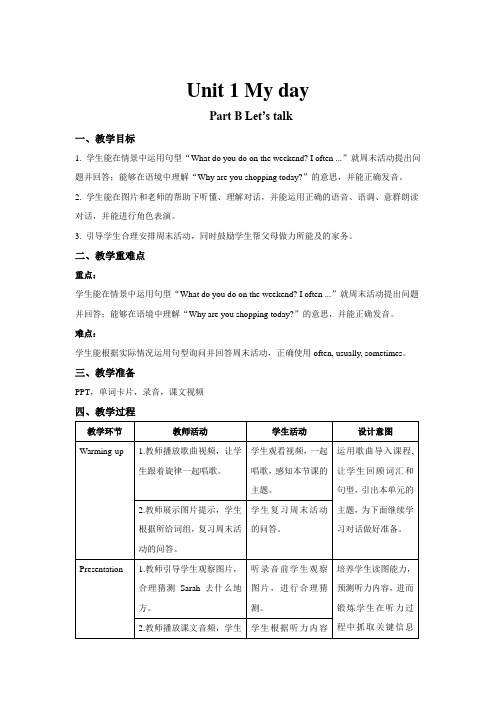
Unit 1 My day
Part B Let’s talk
一、教学目标
1. 学生能在情景中运用句型“What do you do on the weekend? I often ...”就周末活动提出问题并回答;能够在语境中理解“Why are you shopping today?”的意思,并能正确发音。
2. 学生能在图片和老师的帮助下听懂、理解对话,并能运用正确的语音、语调、意群朗读对话,并能进行角色表演。
3. 引导学生合理安排周末活动,同时鼓励学生帮父母做力所能及的家务。
二、教学重难点
重点:
学生能在情景中运用句型“What do you do on the weekend? I often ...”就周末活动提出问题并回答;能够在语境中理解“Why are you shopping today?”的意思,并能正确发音。
难点:
学生能根据实际情况运用句型询问并回答周末活动,正确使用often, usually, sometimes。
三、教学准备
PPT,单词卡片,录音,课文视频
四、教学过程
五、板书设计
Unit 1 Myday
Part B Let’s talk
—What do you do on the weekend?
—I usually/often…
Sometimes I…。
最新人教pep版小学英语五年级下册《Unit 1 My day全单元教学设计》精品优秀实用完整打印版整单元每一课教案

3.能准确发音cl,pl字母组合。
【能力目标】能掌握Part A部分的词汇句型,并能运用所学知识描述一天中的生活起居。
4.小结。
Key words:eat breakfast,play sports…
Key sentences:—When do you do morning exercises?—At 7 o’clock.
Mainscene部分旨在让学生们对本单元内容有个整体大概的了解,通过对话模仿.补充完整对话的活动以达到此目的。
7:30 a.m. go to school 9:00 a.m. have…class
(2)听录音,模仿跟读。
(3)学习Zhang Peng和 Pedro的对话,学生创编对话。(适当提示:画线部分为需替换部分)
When do youdo morning exercises? At7 o’clock.
【情感目标】通过学习本部分内容,引导学生学会合理的安排自己的作息时间。
教学重点
1.掌握Part A的重点词汇。eg:eat breakfast, play sports…
2.掌握Part A重点句型。eg:When do you…?I usually/often…
3.掌握cl.pl的拼读。
教学难点
1.特殊疑问词When的用法。
二、Presentation & Practice
1.学习Main Байду номын сангаасcene。
(1)多媒体呈现Main scene中的情景,播放录音,并思考问题“What are they talking about?”
人教版PEP英语五年级下册《Unit1MydayPartB》(第一课时)教学设计
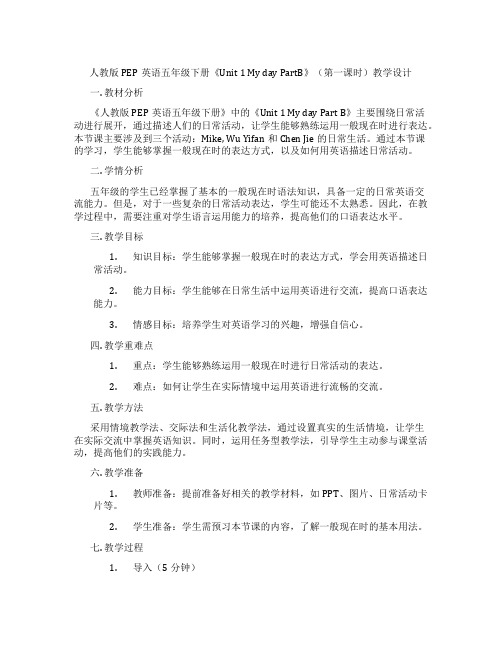
人教版PEP英语五年级下册《Unit 1 My day PartB》(第一课时)教学设计一. 教材分析《人教版PEP英语五年级下册》中的《Unit 1 My day Part B》主要围绕日常活动进行展开,通过描述人们的日常活动,让学生能够熟练运用一般现在时进行表达。
本节课主要涉及到三个活动:Mike, Wu Yifan和Chen Jie的日常生活。
通过本节课的学习,学生能够掌握一般现在时的表达方式,以及如何用英语描述日常活动。
二. 学情分析五年级的学生已经掌握了基本的一般现在时语法知识,具备一定的日常英语交流能力。
但是,对于一些复杂的日常活动表达,学生可能还不太熟悉。
因此,在教学过程中,需要注重对学生语言运用能力的培养,提高他们的口语表达水平。
三. 教学目标1.知识目标:学生能够掌握一般现在时的表达方式,学会用英语描述日常活动。
2.能力目标:学生能够在日常生活中运用英语进行交流,提高口语表达能力。
3.情感目标:培养学生对英语学习的兴趣,增强自信心。
四. 教学重难点1.重点:学生能够熟练运用一般现在时进行日常活动的表达。
2.难点:如何让学生在实际情境中运用英语进行流畅的交流。
五. 教学方法采用情境教学法、交际法和生活化教学法,通过设置真实的生活情境,让学生在实际交流中掌握英语知识。
同时,运用任务型教学法,引导学生主动参与课堂活动,提高他们的实践能力。
六. 教学准备1.教师准备:提前准备好相关的教学材料,如PPT、图片、日常活动卡片等。
2.学生准备:学生需预习本节课的内容,了解一般现在时的基本用法。
七. 教学过程1.导入(5分钟)教师通过提问方式引导学生回顾一般现在时的基本用法,如“What do you do?”“What does he/she do?”等。
然后,展示本节课的主题“My day”,激发学生的学习兴趣。
2.呈现(10分钟)教师通过PPT展示Mike, Wu Yifan和Chen Jie的日常生活图片,引导学生用英语描述他们的活动。
五年级英语下册 Unit 1 My day PB Let's learn 教案 人教PEP版
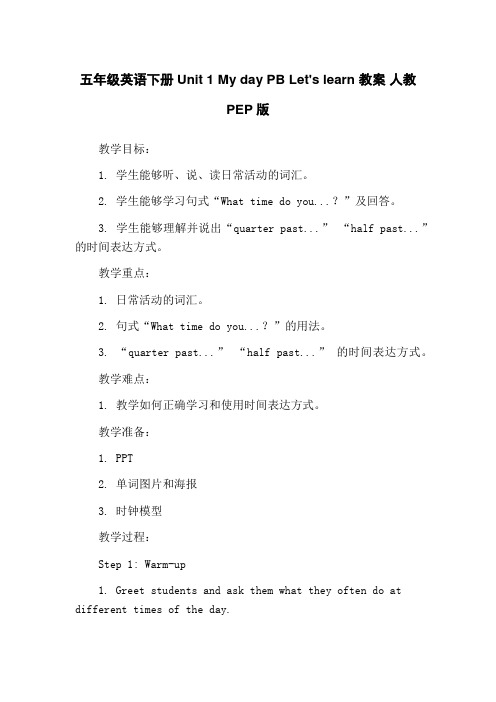
五年级英语下册 Unit 1 My day PB Let's learn 教案人教PEP版教学目标:1. 学生能够听、说、读日常活动的词汇。
2. 学生能够学习句式“What time do you...?”及回答。
3. 学生能够理解并说出“quarter past...”“half past...”的时间表达方式。
教学重点:1. 日常活动的词汇。
2. 句式“What time do you...?”的用法。
3. “quarter past...”“half past...”的时间表达方式。
教学难点:1. 教学如何正确学习和使用时间表达方式。
教学准备:1. PPT2. 单词图片和海报3. 时钟模型教学过程:Step 1: Warm-up1. Greet students and ask them what they often do at different times of the day.2. Show pictures of daily activities and ask students how to say them in English.Step 2: Presentation1. Introduce the new vocabulary through pictures and words, such as “get up,”“brush teeth,” and “have breakfast.”2. Use PPT to show the different times of day and discuss what people are typically doing at those times.3. Introduce the sentence pattern “What time do you...?” and demonstrate how to use it by asking students what time they get up, have breakfast, and so on.4. Show examples of how to answer this question, suchas “I get up at 7 o'clock.”Step 3: Practice1. Practice the new vocabulary by doing a picture matching activity or a “What am I doing?” game.2. Have students practice using the sentence pattern “What time do you...?” in pairs or small groups.3. Practice the new time expressions “quarter past...”and “half past...” using a clock model or drawings. Have students practice telling the time and making sentenceswith these expressions.Step 4: Production1. Have students write about their daily routines,using the sentence pattern and vocabulary learned in class.2. Invite some students to share their writing with the class.Step 5: Review and Assessment1. Quiz the students on the new vocabulary and sentence pattern.2. Review the time expressions and ask students to tell the time using these expressions.3. Assess the students' writing to see if they have mastered the new vocabulary and sentence pattern.教学反思:本节课教学围绕日常活动、时间表达方式展开,使学生掌握日常基础口语能力,并通过练习、创作等形式提高英语语言运用能力。
Unit 1 My day PB Let's learn 教案
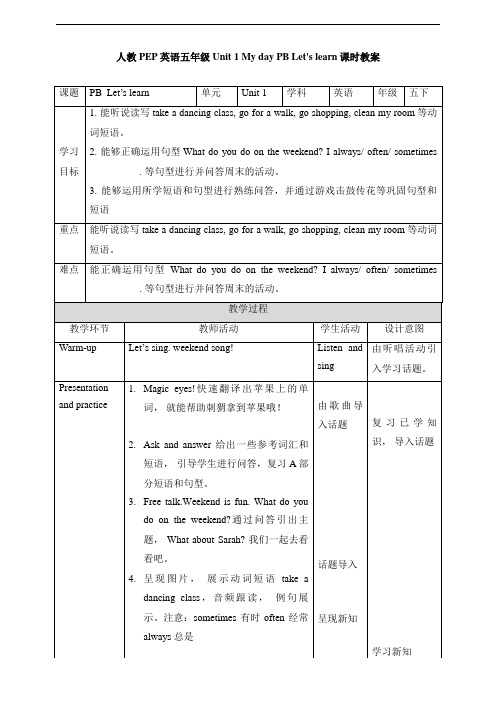
人教PEP英语五年级Unit 1 My day PB Let's learn课时教案5.类似方法学习其他短语go for a walk,go shopping, clean my room 通过图片,音频,句子补充等帮助学生记忆短语等。
注意shop的ing 形式,双写p再加ing,go + v-inggo shopping购物 go fishing钓鱼go hunting 打猎 go swimming 去游泳 ...walk 这里是一个名词,前面加a并和for搭配使用,go for a walk 去散步,也可以说go to walk, 但此处walk是动词等,6.Game time:Which star is missing?7.Game time:大小声游戏,出现喇叭请大声读,没有喇叭请小声读8.Listen, number and match,先听音给汉字标序,然后呈现单词,完成中英文连线,巩固音形意。
9.播放learn部分动画,学生跟读,并模仿语音语调。
10.听音频跟读learn部分句子。
巩固句型。
nguage point:I often clean my roomon Saturdays. often(经常), sometimes(有时), always(总是)都是频度副词,表示做某件事的频率,他们在句中的位置通常放在行为动词之游戏听力练习动画跟读Watch andlearn语言点学习Practice图片,音视频,例句展示,帮助学习新知游戏提高学习兴趣语言点学习,帮助巩固句型情景表演能提高学生的参与性,更好的掌握新授内容在游戏中巩固句型和短语。
最新人教版(PEP版)英语五年级下册Unit1mydayPartB公开课教案1

最新人教版(PEP版)英语五年级下册Unit1mydayPartB公开课教案1Unit 1 My day Part B 教案3教学目标:1.能听、说、读、写词组:clean my room , go for a walk, go shopping ,takea dancing class.2.能结合所给句型:What do you do on the weekend? I often..在实际情境中运用。
3.能理解Let’s wrap it up 部分的内容,并引导学生养成良好的行为习惯。
教学重点:掌握Let’s learn部分的四会词组,并应用。
教学难点:词组的书写,shopping 和dancing单词ing形式的变化。
教学准备:动词卡片,教学挂图、课件、照片教学过程:一、全体学生呼英语励志口号:Knowledge is power.知识就是力量。
二、Warm-upLet’s sing: 教师放p70的Let’s sing 的录音,学生跟唱,活跃课堂气氛。
三、小班内查练:四、导入新课板书课题。
展示本课学习目标,学生齐读本课学习目标。
五、导入并指导学习新的内容:学习Let’s learn(1)clean my room教师出示自己打扫卫生的照片,告诉学生:This is my room ,it isdirty ,so I often clean my room on the weekend.教师领读动词clean,然后提问学生:Do you often clean my room?等学生回答后,教师拿出准备好的动词卡片领读该短语,然后让学生根据自己的实际情况说:I clean my room/class...on the weekend.(2) 学习go for a walkT: After dinner, I often go out in order to be healthy,然后出示go fora walk的卡片,教师领读.(3) 学习go shopping教师出示go hiking 的卡片,说:We can also go shopping on the weekend .通过图片的提示理解词义,并领读。
最新人教版(PEP版)英语五年级下册Unit 1 My day Part B 3公开课课件

有时
Phrases review
worked last night 昨晚工作、干活 often watch TV 经常看电视 play ping-pong with my father 和我父亲一起打乒乓球 a lot of fun 大量的乐趣 sometimes I cook dinner 我有时候做晚饭
店主,老板
Shopkeeper: Why are you shopping today ? Sarah: My mum worked last night . So I am shopping today. Shopkeeper: Good girl! So what do you do on the weekend? Sarah: I often watch TV and play ping-pong with my father. Shopkeeper: That sounds like a lot of fun. Sarah: Yes, but I’m also hard-working. I usually wash my clothes. Sometimes I cook dinner. Shopkeeper: You’re so busy! You need a robot to help you !
Sarah
Saturday
Where is Sarah on this Saturday?
Let’s try
Where is Sarah? Listen and circle. shop school
library
What is Sarah doing in this shop?
Mrs. Green shopkeeper
watch TV 看电视
Unit 1 My day Part B(教案)人教PEP版英语五年级下册

Unit 1 My DayPart BLet’s learn & Do a survey【教学目标】1. 熟练掌握Let’s learn部分四个日常活动的词组:clean my room、go for a walk、go shopping、take a dancing class。
2. 能够表达自己在周末通常做某事:I often… on Saturdays/Sundays/the weekend.3. 能够根据实际情况填写表格以及进行语言交际:What do you do on the weekend? I always/often/sometimes… with… on Saturdays/Sundays/the weekend.4. 在日常生活中使学生养成用英语交流的习惯,培养学生合理安排时间,珍惜时间的好习惯。
【教学重难点】重点:掌握四会动词短语,并用于句型“I often/usually/always/sometimes clean my room/… on Saturdays.”来谈论周末活动。
难点:1. 准确运用频率副词always/often/sometimes以及时间状语on Saturdays/ Sundays/ the weekend进行语言交际。
2. Do a survey部分的造句活动。
【课前准备】1. 单词卡片。
2. 教学光盘或其他录音机设备。
3. 教学课件。
【教学过程】Step 1:Warm up教师拿单词卡片展示短语词组do morning exercises、eat breakfast……,学生“开火车”复习词组。
Step 2:Presentation(1)教师请小组展示周末活动,并引出所要学的词组。
教师问:“在做家务活这一方面,大家有没有打扫自己的房间呢?”,引出clean my room;“锻炼身体一般以什么为主呢?”学生回答:“go swimming, play football, play ping-pong”等。
五年级英语下册 Unit 1 My day PB Let's talk 教案 人教PEP版

五年级英语下册 Unit 1 My day PB Let's talk 教案人教PEP版教学目标:1.能够听懂、会说、会读、会写单词和短语clock, eight, ten, twelve, four, six, wake up, brush, wash, eat, read, play, go;2. 能够听懂、会说、会读、会写句型What time do you…? I usually….,并能够用所学语言表述自己日常的活动时间;3.能够听懂有关日常生活的简单短文,并提取相关信息;4.培养学生自主学习能力和合作精神。
教学重点:1. 询问和描述日常活动的时间,并能够运用What time do you…?和I usually…表述;2. 听懂和提取简单短文的信息。
教学难点:能够听懂和说出简单句型What time do you…?和I usually…及相关语言,根据所学的句型表述自己的日常活动时间。
教学准备:PPT、flashcard、黑板、教师用笔、课件、录音笔等。
教学方法:听说读写结合,以情境为主导,注重学生的合作学习和互动交流。
教学过程:Step 1 GreetinT:Good morning, boys and girls.S:Good morning, Miss Xiao.T:How are you?S:I'm fine, thank you. And you?T:I'm fine, too. Thank you.Step 2 Revision1.Review the greeting words with the students.2.Review the body parts with the song Head and shoulders.Step 3 Presentation1.Use the word cards to introduce new words:clock,eight,ten,twelve,four,six,wake up,brush,wash,eat,read,play,go.2. Let's talk.(1) T: What time do you usually wake up?S: I usually wake up at six o'clock.T: What do you usually do after you wake up?S: I usually brush my teeth.(2) T: What time do you usually eat breakfast?S: I usually eat breakfast at eight o'clock.T: What do you usually eat for breakfast?S: I usually eat bread, eggs and milk.(3) T: What time do you usually go to school?S: I usually go to school at ten to eight.T: What do you usually do in school?S: I usually study, read and play.(4) T: What time do you usually go home after school? S: I usually go home at twelve o'clock.T: What do you usually do after school?S: I usually have lunch and then take a nap. (5) T: What time do you usually play after nap?S: I usually play at four o'clock.T: What do you usually play?S: I usually play soccer.(6) T: What time do you usually have dinner?S: I usually have dinner at six o'clock.T: What do you usually eat for dinner?S: I usually eat rice, vegetables and meat. (7) T: What do you usually do after dinner?S: I usually read books.(8) T: What time do you usually go to bed?S: I usually go to bed at ten o'clock.3.Play a guessing game “What’s missing?”将词卡放于黑板上,在学生眼前展示,让学生看一看,以便记住这些单词。
五年级下册英语教案-Unit 1 My day B课时3∣人教PEP

Unit 1My dayPart B本课是PEP 小学英语五年级下册第一单元Part B部分。
本部分是Part A的延续,重点学习周末活动安排的表达,尤其是学会使用频度副词谈论日常生活。
第三课时【知识目标】1、能读懂Read and w rite。
2、掌握本单元的词组。
【能力目标】1、能在Let’s check 部分用本课目标语言问他人周末的活动安排,从而能找到能在周末共同活动的伙伴。
2、通过本课学习,能加强对本单元知识点的掌握。
【情感目标】引导培养学生良好的生活习惯,合理安排假期生活。
【教学重点】Let’s wrap it up.能够正确搭配词组。
【教学难点】教学课件、教学录音带、单词卡、图片Step 1. Warm-up1.free talkT: Morning,class.Ss: Morning, teacher.T:Do you like reading books?Ss: Yes.2.Give answers about yourself.我问你答。
T:What do you do on the weekend?S1:I often…S2:I always…S3:I sometime s…Step 2. Preview让学生说说自己都看过哪些国内外名著,由此引出《鲁宾逊漂流记》这一名著。
教师给学生说说原书中鲁宾逊与星期五之间的故事。
(这一部分可让看过此书的学生先来说,培养学生胆量及语言组织能力。
)Step 3. Pr esentation1.学习Read and write。
(1)由warm-up让学生了解了原著中鲁宾逊与星期五之间的故事,那下面我们就一起来看看在Robin的剧本中的鲁宾逊和星期五。
(2)学生在教师规定时间分组完成课本练习。
(3)师生核对。
(4)展示课件,点击鼠标,呈现课本第一段内容,注意用不同颜色标记出重点单词。
如:live on, island, wash my face, early等。
Unit1MydayPartALet'slearn(教案)-人教PEP版英语五年级下册

7.Game time:打地鼠,巩固所学词汇。
8.Let’s learn:播放learn部分动画,学生跟读,并模仿语音语调,讲解句型
人教PEP英语五年级下册Unit 1 My day PA Let's learn课时教案
课题
PA Let'slearn
单元
Unit1
学科
英语
年级
五下
核心素养教学目标
(一)语言知识目标:
1.能在图片和文本语境的帮助下,熟练运用本单元的核心单词和句型,
2.能正确运用所学词汇和句型日常活动的时间等相关问答, 大胆说英语。
2.Lead in!呈现图片What do you often do on school days?提出疑问并根据Mike的表进行回答!
3.Lead in!呈现图片Who is he?Pedro,A newstudent here.提出问题,What does Pedro do on school days?引出新知
的学习兴趣。
4.突心语用功能,通过创设合理的情景,帮助学生在情景中真实自然地使用所学语言。
4.展示图片,Look. This is Pedro’s timetable.Let’s go and see.
5.Presentation:展示图片,呈现单词exercise和短语do morning exercises,讲解单词发音,书写,通过图片,音频,巧记等巩固单词。exercise意思为做早操,作为可数名词要加s
五年级英语下册Unit 1 My day Part B优质课公开课教案

Unit 1 My dayPart B Let’s learn & Do a survey一..Learning aims(学习目标)知识目标1.能够听说读写四个动词短语:clean my room, go for a walk, go shopping, take a dancing class。
2.掌握句型:“I often/usually/always/sometimes clean my room/…on Saturdays”。
3.能够体会理解和运用频度副词:usually,often,sometimes,always。
4.能够运用所学句型和短语简单描绘周末活动。
5.能够区分并应用take a /an……class和have a /an……class。
6.能够理解应用go+v-ing。
能力目标1.能够用英语简单描述自己一天的学习和生活安排,能够询问别人的时间安排。
2.能够与他人运用所学句型进行日常安排的交流,培养学生灵活运用所学知识进行交流的能力。
3.了解一些固定搭配的区别和应用。
情感目标1.激发学生学习英语的兴趣,使学生树立学习英语的自信心,提升与他人交流与合作的能力。
2.培养学生认真观察本课生词和新句子所在语境,大胆开口使用英语的良好习惯和主动学习的能力。
3.培养学生学会合理统筹的安排时间,养成良好的生活与学习习惯。
二.Important &difficult points(重难点)1. 掌握四会动词短语,并用于句型“I often/usually/always/sometimes clean my room/go for a walk/go shopping/take a dancing class on the weekend/on Saturdays/on Sundays.”谈论周末活动。
2. 能运用usually/often/always/sometimes进行替换练习。
五年级英语下册 Unit 1 My day PB Let's learn 说课稿 人教PEP版

五年级英语下册Unit 1 My day PB Let’s learn 说课稿人教PEP版一、说明本文是五年级英语下册Unit 1 My day PB Let’s learn 的说课稿,适用于人教版PEP教材,旨在讲解教材中的重点、难点和教学方法,以帮助教师更好地教授本课。
二、教材分析1. 教材内容简介本单元教材以介绍日常生活为主要内容,涉及话题包括:日常活动、家庭成员及其关系、时间等。
本单元是英语课程的开端,所以要求学生能够正确的使用基本语言,并将其应用于日常生活中。
2. 教学目标•理解并正确使用词汇:get up、brush、wash、have breakfast、go to school 等。
•理解并能够询问自己和他人日常生活活动,并表达自己的日常生活活动。
•理解并正确使用时间、疑问词等语言知识。
•培养学生说英语的兴趣和勇气,能够自信的表达自己的想法。
3. 语言重点•get up、brush、wash、have breakfast、go to school等动词的正确使用。
•How about you?的正确使用。
•时间、疑问词的使用。
4. 语言难点•how about句型和其它有关日常生活的句型的运用。
•过去式、一般现在时的辨析。
•疑问句形式及其回答方式。
三、教学方法1.让学生在轻松、愉快的环境中学习英语,培养其英语学习兴趣和口语表达能力。
2.采用游戏、模拟训练等多种教学手段,使学生在熟悉、轻松、愉悦的氛围中学习和掌握本单元的相关知识、技能和方法。
3.引领学生积极参与英语语言使用训练,充分发挥他们的语言天赋,培养他们的英语交际能力和自信心。
四、教学过程1. Warm-up1.找几名学生来介绍一下自己的日常生活。
2.让学生画画,画出自己在不同时间段的日常活动。
2. Presentation1.通过图片、视频展示,介绍get up、brush、wash、have breakfast、go to school等动词的正确使用。
小学人教PEP版英语五年级下册《Unit 1 My day PB》教案

PEP 6 Unit1 My dayPB 教案第一课时【教学目标】1.语言技能:(1)能够听懂、看懂并认读以下单词或词组:why, shopping, worked, last night, with, sound, busy, hard-working.(2)能够完成听力任务,正确听出Sarah与shopkeeper的谈话,并圈出Sarah她所在的场地。
( 3 ) 学生能够理解Let’s talk的对话,并就对话进行分析和角色表演。
(4)通过所学重点词汇与句型,能就自己平日经常所做的事情进行交谈:What do you do on the weekend? I (usually/often/ sometimes) … (with…).2.语言知识:(1)理解一般现在式的表意功能,并运用到真实情境中,询问或表达在周末经常做某事的句子, 能在现实生活中运用。
(2)能够理解并掌握重点词汇与句型,理解一般现在式表示动作频率的概念。
3.情感态度、学习策略与文化意识:(1)激发学生的英语学习兴趣,培养良好的英语学习习惯。
(2)培养学生体恤父母,帮助长辈,勤劳动手的社会责任感和能力。
【教学重点】(1)句型:What do you (usually/always…) do on the weekend? I (usually/often/ always/ sometimes) … and …(with…).(2)词汇:why, shopping, worked, last night, with, sound, busy, need, clean my room, go for a walk, go shopping, take a dancing class.【教学难点】(1)了解usually, often, sometimes的使用。
(2)在掌握时间、动作等重点动词的同时,理解一般现在式表示做某件事情的频率的表意功能及该如何回答。
Unit 1 My day PB let's talk(公开课) 教案

人教PEP英语五年级下册Unit 1 My day PB Let's talk课时教案课题PB Let's talk 单元Unit 1 学科英语年级五下学习目标1. 能够熟读talk部分对话并能进行情景表演。
2. 能熟练运用句型What do you do on the weekend? I always /often /sometimes /usually ...询问并回答对方周末活动相关问题。
3. 能熟练进行对话,并能通过游戏和小组活动巩固句型。
重点能够熟读talk部分对话并能进行情景表演并能通过游戏和小组活动巩固句型。
难点能熟练运用句型What do you do on the weekend? I always /often /sometimes /usually ...询问并回答对方周末活动相关问题。
教学过程教学环节教师活动学生活动设计意图Warm-up PPT 播放Let’s sing: My weekend song. Let’s sing 由听唱活动引入学习话题。
Presentation and practice 1.Magic eyes! 眼睛里的世界What canyou see?透过眼球你能看到什么呢,快速说出看到的短语!2.Ask and answer,呈现一些短语图片,学生选择任意图片进行对话.3.Lead in:Today is Saturday. Where isSarah? 呈现try部分三个图片,先看图,认读图片里的场所,然后听录音,注意抓住重点信息,独立完成听力任务游戏,复习Free talk复习单词和句型Lead in听力内容游戏提高学生学习兴趣Free talk复习相关知识完成听力任务。
Unit 1 My day PB Let's learn 教案
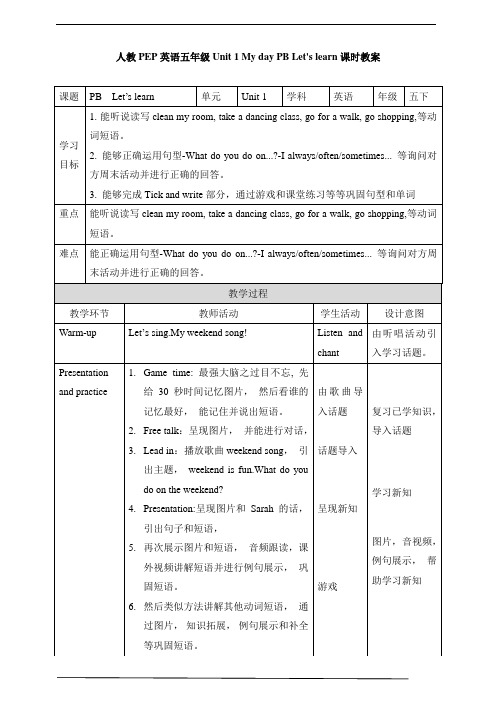
15.Practice:呈现更多图片,呈现句型,进行问答练习。
16.Practice:选择正确的答案
17.Practice:按要求完成句子
18.Let's chant,播放sing,
由歌曲导入话题
话题导入
呈现新知
游戏
动画跟读
人教PEP英语五年级Unit 1 My day PBLet's learn课时教案
课题
PBLet’slearn
单元
Unit1
学科
英语
年级
五下
学习
目标
1.能听说读写clean my room, take a dancing class, go for a walk, go shopping,等动词短语。
难点
能正确运用句型-What do you do on...?-I always/often/sometimes...等询问对方周末活动并进行正确的回答。
,
教学过程
教学环节
教师活动
学生活动
设计意图
Warm-up
Let’ssing.My weekendsong!
Listen andchant
由听唱活动引入学习话题。
Presentation and practice
1.Game time:最强大脑之过目不忘,先给30秒时间记忆图片,然后看谁的记忆最好,能记住并说出短语。
2.Free talk:呈现图片,并能进行对话,
3.Lead in:播放歌曲weekend song,引出主题,weekend is fun.What do you do on the weekend?
- 1、下载文档前请自行甄别文档内容的完整性,平台不提供额外的编辑、内容补充、找答案等附加服务。
- 2、"仅部分预览"的文档,不可在线预览部分如存在完整性等问题,可反馈申请退款(可完整预览的文档不适用该条件!)。
- 3、如文档侵犯您的权益,请联系客服反馈,我们会尽快为您处理(人工客服工作时间:9:00-18:30)。
PEP 6 Unit1 My dayPB 教案第一课时【教学目标】1.语言技能:(1)能够听懂、看懂并认读以下单词或词组:why, shopping, worked, last night, with, sound, busy, hard-working.(2)能够完成听力任务,正确听出Sarah与shopkeeper的谈话,并圈出Sarah她所在的场地。
( 3 ) 学生能够理解Let’s talk的对话,并就对话进行分析和角色表演。
(4)通过所学重点词汇与句型,能就自己平日经常所做的事情进行交谈:What do you do on the weekend? I (usually/often/ sometimes) … (with…).2.语言知识:(1)理解一般现在式的表意功能,并运用到真实情境中,询问或表达在周末经常做某事的句子, 能在现实生活中运用。
(2)能够理解并掌握重点词汇与句型,理解一般现在式表示动作频率的概念。
3.情感态度、学习策略与文化意识:(1)激发学生的英语学习兴趣,培养良好的英语学习习惯。
(2)培养学生体恤父母,帮助长辈,勤劳动手的社会责任感和能力。
【教学重点】(1)句型:What do you (usually/always…) do on the weekend? I (usually/often/ always/ sometimes) … and …(with…).(2)词汇:why, shopping, worked, last night, with, sound, busy, need, clean my room, go for a walk, go shopping, take a dancing class.【教学难点】(1)了解usually, often, sometimes的使用。
(2)在掌握时间、动作等重点动词的同时,理解一般现在式表示做某件事情的频率的表意功能及该如何回答。
【教学准备】(1)教师准备与本课时相关教学卡片、录音、视频及课件。
【教学过程】Step 1:热身互动1)师生互致问候。
T:Good morning, boys and girls.2)Free talk教师与学生自由对话,引入一般现在时态中关于动作频率的概念。
T: Do you often wash your clothes on the weekend?Ss: Yes, I do.T: Now it’s time for you to make your dialogues.(设计意图:回顾动词、时间频率和周末,让学生快速进入主题,并为下面引出主题坐下铺垫。
)Step2 预授准备1) Let’s sing!I like to do things on the weekend.I clean my room and go shopping at the mall.I have a music class and do exercises.I play football and play basketball.2)Let’s tryWhere is Sarah?T: Where is Sarah?Ss: She’s in the shop.T: How do you find the answer?Step3 导入新课1)学习听力材料Sarah: Hello, Mrs Green. Good to see you!Shopkeeper: Hi, Sarah. Welcome to our shop again.Sarah: I want to buy some vegetables.Shopkeeper: Here are some fresh carrots. You don’t often shop here on Saturdays.Sarah: No, not often.T: Sarah doesn’t often shop to buy vegetables.2)处理let’s talk文本,阅读并判断对错Why are you shopping today?My mum worked last night.So I’m shopping today.Good girls!So what do you do on the weekend?I often watch TV and play ping-pong with my father.That sounds like a lot of fun.Yes, but I’m also hard-working.I usually wash my clothes.Sometimes I cook dinner.You’re so busy!You need a robot to help you.Why is she shopping today? Read and try to find it out.(设计意图:将学生有被动听力转为主动学习,将所学词汇运用于阅读中,提高语言的运用能力。
)Ss: Her mum worked last night.work 工作---过去式worked last 前一个last night 昨天晚上( ) 1. I often watch TV and play ping-pong with my friends.( ) 2. I sometimes wash clothes.( ) 3. I’m very h ard-working.(××√)知识点:with 和…一起sometimes 有时候also 也hard-working 努力的(设计意图:通过判断对错,加深学生主动运用语言的能力,并化被动学习为主动学习,为下面深入阅读,情感提升做好铺垫。
)3)Let’s read together.★Read with partners!同桌之间分角色朗读!★★Read with partners!同桌之间分角色朗读!★★★Underline the ones you don’t know.在不知道的地方划线。
4)讲解文章中的知识要点Why are you shopping? (今天为什么是你在购物?)My mum worked last night.So I’m shopping today. (so 所以)Good girl! (好孩子!)So what do you do on the weekend?(那么你周末做什么?)I often watch TV and play ping-pong with my father. (with 和…一起)That sounds like a lot of fun. (听起来像)Yes, but I’m also hard-working. (用功的)I usually wash clothes. Sometimes I cook dinner.You’re so busy! (busy 忙碌的)You need a robot to help you! (need 需要)5)Let’s read!6)Good to know知识要点的复习Shop 购物你何时购物?When do you shop?Shop 商店 a book shop a toy shopalso 也too also放于句子中间too放于句子末尾I’m also hard-working. = I’m hard-working, too.7)Pair workT: What about you?What do you do on the weekend?I often/ usually____________ .(设计意图:通过知识要点的复习后,在回到学生自己的真实生活情境中,要学生根据自己的实际情况,使用目标词汇和句型。
)Step 4 巩固环节1.The story sounds _____ a lot of fun.A. toB. forC. like2. I _______ dinner at 6:30 p.m.A. doB. haveC. play3.--- _____ do you do on the weekend?--- I often play sports with my friends.A. WhatB. WhenC. WhereStep5 作业1. Read the text on P7 for 15 minutes and try to remember the new words and sentences.2. Act the dialogue out with your partner.【板书设计】Unit 1 My dayPBWhat do you do on the weekend?I (often/ usually/ always) ….课时二【教学目标】1.语言技能:(1)学生能够理解Let’s learn的学习,并正确听说、认读并书写以下单词或词组:clean my room, go for a walk, go shopping, take a dancing class.(2)能够完成Do a survey中的任务,就平日经常或偶尔从事的活动进行交流,语用句型:What do you do on the weekend? I (usually/often/ sometimes) … (with…).( 3 ) 通过所学重点词汇与句型,能就自己平日经常所做的事情进行交谈:What do you do on the weekend? I (usually/often/ sometimes) … (with…).2.语言知识:(1)理解一般现在式的表意功能,并运用到真实情境中,询问或表达在周末经常做某事的句子,能在现实生活中运用。
(2)能够理解并掌握重点词汇与句型,理解一般现在式表示动作频率的概念。
3.情感态度、学习策略与文化意识:(1)激发学生的英语学习兴趣,培养良好的英语学习习惯。
(2)培养学生互相关心,运用英语就熟悉话题进行交流的能力。
【教学重点】(1)句型:What do you (usually/always…) do on the weekend? I (usually/often/ always/ sometimes) ….(2)词汇:clean my room, go for a walk, go shopping, take a dancing class.【教学难点】(1)了解usually, often, sometimes的使用。
